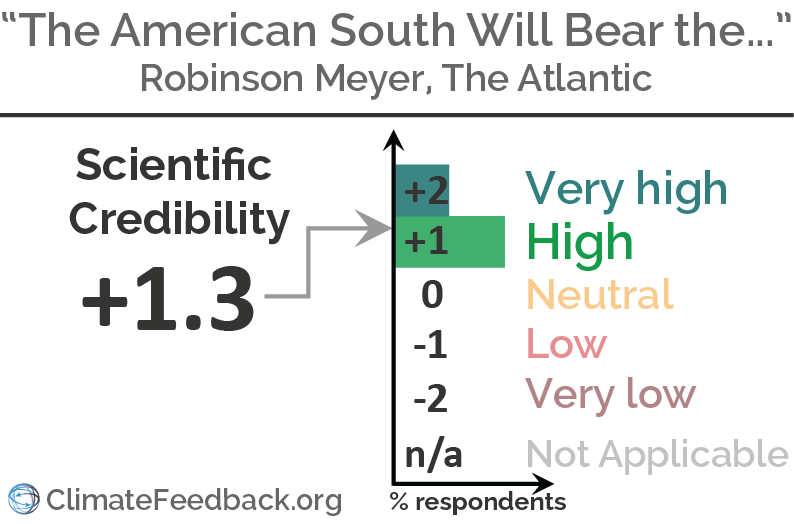- Climate
The Atlantic accurately reports on study of the economic impacts of continued climate change in the US
Reviewed content

Headline: "The American South Will Bear the Worst of Climate Change’s Costs"
Published in The Atlantic, by Robinson Meyer, on 2017-06-29.

Scientists’ Feedback
SUMMARY
This story in The Atlantic by Robinson Meyer describes a new study on the distribution of economic impacts that result from continued climate change in the United States. The study finds that the impacts would not be uniform throughout the country, but would reduce GDP to a greater degree in southern states, for example, while the northernmost states could experience net economic benefits from warmer temperatures.
Scientists who reviewed the article indicate that it accurately summarizes the study, although the topic of climate impacts is broad and complex, and can inevitably benefit from additional context.
REVIEWERS’ OVERALL FEEDBACK
These comments are the overall opinion of scientists on the article, they are substantiated by their knowledge in the field.

Associate Professor, Yale University
The article is well written, engaging, and correctly described the findings of the Science article. It could have been more introspective about what the results of the Science article actually mean. (E.g. do the results still hold if the geographic distribution of population and economic activity changes in response to climate from 2012 levels? Are the differences between the south and north robust to a broader range of uncertainty than the limited uncertainty examined in the Science article?)

Assistant Professor, University of California Davis
The article accurately describes the findings of the paper it is discussing, which is an important scientific contribution. It points out the key conclusions and contributions correctly.

Professor of Economics and Environmental Studies, Wesleyan University
The study makes an enormous contribution by updating aggregate economic reaction functions (sectoral and locational) across a large portion of the economy calibrated in currency and percentage changes in income for the end of the century) that will inform integrated assessment modeling efforts and estimates of the social cost of carbon for the United States.
Even though it is not completely comprehensive (so the estimates and ranges continue to be lower bounds of actual totals), the estimates are higher than earlier numbers and ranges because the analysis covers more ground very carefully and digs down to county level climate risks. Spatial variability makes the aggregates less subject to the downward push of aggregating over wider areas (i.e., highs and lows do not cancel as much).
Estimates of the social cost of carbon for the US should now be higher than before (they have persistently been orders of magnitude smaller than the world before now—a fact that led the EPA and the Supreme Court, to name two interested bodies, to use global estimates for the value of removing carbon emissions by, for example, raising CAFE standards for vehicles).
Notes:
[1] See the rating guidelines used for article evaluations.
[2] Each evaluation is independent. Scientists’ comments are all published at the same time.



